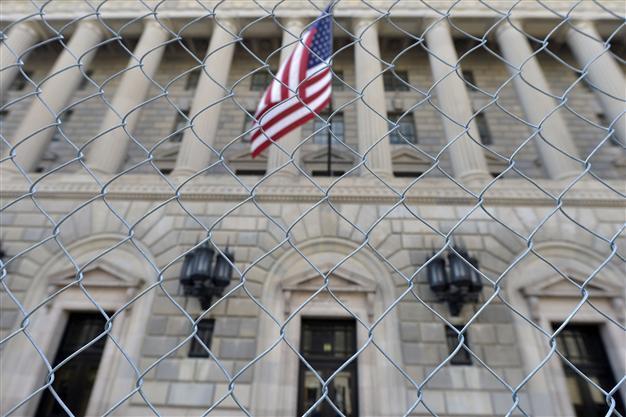United States in battles over budget, debt limit
WASHINGTON - Reuters

The last big confrontation over the debt ceiling, in August 2011, ended with an 11th-hour agreement under pressure from angry and shaken markets. REUTERS photo
As the U.S. government moved into the second week of a shutdown with no end in sight, a deadlocked U.S. Congress also confronted an Oct. 17 deadline to increase the nation’s borrowing power or risk default.White House officials said yesterday that President Barack Obama would not negotiate with congressional Republicans under the threat of a debt default and repeated that it is up to Congress to raise the U.S. borrowing cap.
“There has never been a period where you have a serious faction or a serious strategy by one political party ... to use the threat of default as the main tactic in extracting policy,” White House National Economic Council Director Gene Sperling said at a Politico breakfast.
Republican House of Representatives Speaker John Boehner vowed not to raise the U.S. debt ceiling without a “serious conversation” about what is driving the debt, while Democrats said it was irresponsible and reckless to raise the possibility of a U.S. default.
Last confrontation in 2011
The last big confrontation over the debt ceiling, in August 2011, ended with an 11th-hour agreement under pressure from shaken markets and warnings of an economic catastrophe if there was a default.
A similar last-minute resolution remained a distinct possibility this time as well.
China, the biggest holder of U.S. Treasuries, urged Washington to take decisive steps to avoid a crisis and ensure the safety of Chinese investments.
“The U.S. is totally clear about China’s concerns about the fiscal cliff,” Vice Finance Minister Zhu Guangyao said in the Chinese government’s first public comment on the Oct. 17 deadline.
“We hope the U.S. fully understands the lessons of history,” Zhu told reporters in Beijing, referring to the downgrade of the U.S. credit rating by Standard & Poor’s in 2011.
China held $1.277 trillion of U.S. Treasuries as of last July, according to the official data.
The two issues of the Federal government shutdown and the debt ceiling started out separately in the House but have been merged by the pressure of time.
Conservative Republicans in the House have resisted funding the government for the current fiscal year until they extract concessions from Obama that would delay or defund his signature healthcare law, which launched Oct. 1. Many of the conservatives want a similar condition placed on raising the debt ceiling, but in his list of debt-ceiling demands Sunday, Boehner did not mention the Affordable Care Act, commonly known as Obamacare.
“It’s time to talk about the spending problem,” said Boehner, including measures to rein in costs of entitlement programs such as the Social Security retirement system and Medicare, the government-run health insurance program for seniors.
















